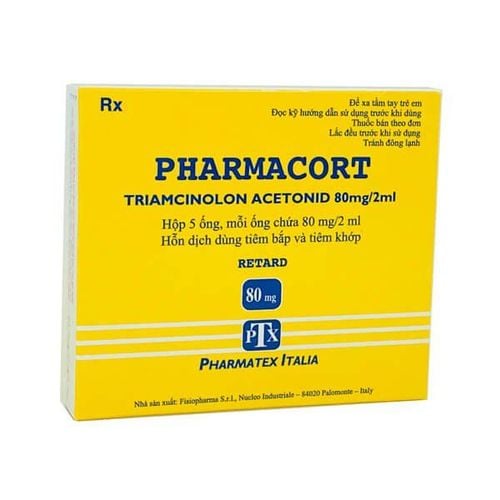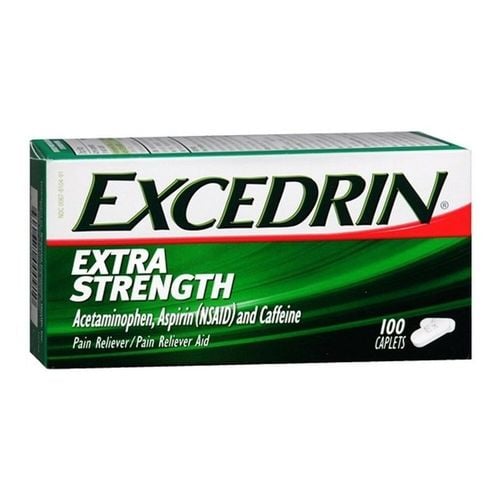This is an automatically translated article.
Taxanzan has analgesic and antipyretic effects similar to aspirin. The active ingredient Paracetamol in the drug has a mechanism of lowering body temperature in patients with fever, acting on the hypothalamus causing hypothermia, vasodilation and increased peripheral blood flow.1. What is Taxanzan?
Taxanzan is an analgesic, antipyretic, anti-inflammatory drug packaged in the form of tablets containing the following ingredients:
Paracetamol content 325mg; Ibuprofen 200mg.
2. Taxanzan drug use
Paracetamol content in Taxanzan drug has analgesic and antipyretic effects similar to Aspirin. Paracetamol lowers body temperature in febrile patients, acts on the hypothalamus to cause hypothermia, vasodilation, and increased peripheral blood flow.
Paracetamol with therapeutic doses has little effect on cardiovascular and respiratory systems, does not change acid-base balance, scratch or stomach bleeding, because this active ingredient only affects cyclooxygenase/prostaglandin of the central nervous system. nurse.
3. Indications of the drug Taxanzan
Taxanzan is indicated for the relief of mild to moderate muscle and bone pain such as:
Neck strain; Toothache ; Low back pain; Inflammation and rheumatism, bursitis ; Muscle pain, sprain; Fractures, dislocations; Pain after surgery; Menstrual pain, headache.
4. Taxanzan drug dosage
Taxanzan should be taken after meals with the following dosage:
Adults: 1 - 2 tablets x 3 times/day.
In chronic cases: Take 1 tablet x 3 times/day.
Taxanzan dosage above is for reference only. The specific dose will depend on the condition and the progression of the disease. Therefore, you need to consult your doctor or medical professional to get the right dose.
5. Contraindications to the drug Taxanzan
Taxanzan drug is contraindicated in the following cases:
Hypersensitivity to the components of Taxanzan drug; Patients with deficiency of the enzyme glucose - 6 - phosphate dehydrogenase ; A history of hypersensitivity reactions to aspirin or non-steroidal anti-inflammatory drugs; History of or ongoing gastrointestinal bleeding; Disorders in blood clotting; Colloid disease, hypovolemia due to diuretics; People with kidney failure, asthma; Severe liver and kidney failure; Congestive heart failure ; Are using other drugs containing Paracetamol, non-steroidal anti-inflammatory; Children under 18; Pregnant women in the last 3 months.
6. Drug interactions
Taxanzan may interact with the following drugs if taken together:
Acetylsalicylic drugs (doses above 75 mg/day), Paracetamol or other non-steroidal anti-inflammatory drugs; Drugs that increase the anticoagulant effect of Coumarin and Warfarin; Cholestyramine; Ibuprofen; Zidovudine.
7. Taxanzan side effects
When using Taxanzan, patients may experience the following side effects:
Common: Rash, fever, fatigue, abdominal bloating, nausea and vomiting, headache, dizziness, dizziness, restlessness; Uncommon: Urticaria, allergic reactions, rhinitis, gastrointestinal bleeding, peptic ulceration, insomnia, tinnitus, visual disturbances, hearing loss, prolongation of flow time, neutropenia and pancytopenia, anemia; Rare: Aseptic meningitis, Stevens-Johnson syndrome, alopecia, blurred vision, decreased visual acuity, depression, gallbladder contractility, hepatotoxicity, cystitis, hematuria. Inform your doctor about the unwanted effects that you experience when using Taxanzan for appropriate management.
The article has provided information on the uses, doses and notes when using Taxanzan. To ensure the safety of your health and maximize the effectiveness of treatment, you need to take the medicine exactly as directed by your doctor.
Please dial HOTLINE for more information or register for an appointment HERE. Download MyVinmec app to make appointments faster and to manage your bookings easily.













